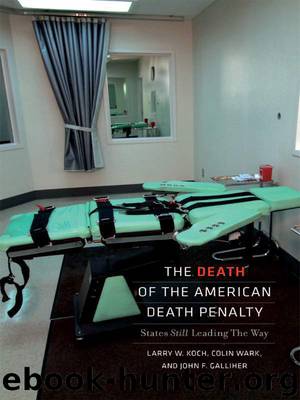The Death of the American Death Penalty by Larry W. Koch

Author:Larry W. Koch [Larry W. Koch]
Language: eng
Format: epub
Publisher: University Press of New England
Published: 2012-06-25T16:00:00+00:00
8
Recent Abolition Near Misses
Nebraska and Maryland
Maryland and Nebraska became unlikely participants in the abolition movement of the post-Furman era more by the legislative skill and charisma of core actors than by the structural foundations of the states. Execution levels in Nebraska—with its western-leaning geography, economy, and culture—reflected those in agrarian, sparsely populated, highly homogeneous western states. With the rise of a gifted and tenacious state senator, however, Nebraska became a hotbed of abolitionist debate for three decades. And if the abolition effort in Nebraska was unlikely, a strong abolitionist movement in Maryland should have been impossible. In reality, Maryland is currently involved in an abolition narrative that will probably halt executions, if the state does not abolish the death penalty.
NEBRASKA
The history of legal executions in Nebraska is relatively short in comparison with the history of states further to the east. Since 1879 the state has carried out thirty-seven legally sanctioned executions, three of which were post-Furman . 1 The electrocution of Charles Starkweather on 25 June 1959 remains, without a doubt, Nebraska’s most infamous execution. The nineteen-year-old man’s eight-day drive across the Nebraska countryside during January 1958 that resulted in the murder of ten people has provided plots for books, movies, and songs. 2
Since the enactment of Nebraska’s post-Furman death penalty statute in 1973, the state’s juries have handed down thirty-three death sentences. Three Nebraska inmates have been executed; four died on death row; thirteen had their sentences commuted; and one had his sentenced vacated. Eleven men remain on death row, awaiting either execution or appellate relief. 3
Enter Senator Ernie Chambers
Even a cursory review of Nebraska’s post-Furman death penalty narrative attests to the central role that human agency played in keeping executions on the minds of legislators. Senator Ernie Chambers entered the Nebraska Unicameral Legislature in 1970. A barber, Chambers holds a law degree from Creighton University. Unlike the majority of his colleagues, he did not supplement his $12,000 salary with other income. 4 Thus, he led a near-poverty existence. In a state that is less than 5 percent African American, he remained the sole black legislator until 2008, when a newly enacted term-limit law directed at him forced him out. Referring to the forty-nine member Senate, he stated: “By getting rid of me, they got rid of the other forty-eight.” 5
A progressive, he consistently and overtly supported pro-choice legislation. 6 His efforts in the 1980s moved Nebraska to lead all states in divesting from companies that did business with apartheid-era South Africa. 7 Abolishing the state’s death penalty, however, drove his legislative efforts. During every legislative session between 1976 and 2008, Chambers introduced a bill calling for the abolition of executions. Although Nebraska’s unicameral legislature allowed the state to assume a leadership role in reducing the penalty for marijuana possession in the late 1960s, 8 that legislature structure did little to facilitate Chambers’s efforts to abolish the death penalty. Rather than coalition building, his legislative strengths were skillful oratory, humanistic values, the power of persuasion, and an unwavering belief in the righteousness of the cause.
Download
This site does not store any files on its server. We only index and link to content provided by other sites. Please contact the content providers to delete copyright contents if any and email us, we'll remove relevant links or contents immediately.
The Borden Murders by Sarah Miller(4313)
The Secret Barrister by The Secret Barrister(3696)
Police Exams Prep 2018-2019 by Kaplan Test Prep(2540)
Coroner's Journal by Louis Cataldie(2476)
The Splendid and the Vile by Erik Larson(2458)
Terrorist Cop by Mordecai Dzikansky & ROBERT SLATER(2072)
A Colony in a Nation by Chris Hayes(1927)
My Dark Places by James Ellroy(1926)
The Art of Flight by unknow(1872)
Black Klansman by Ron Stallworth(1790)
Objection! by Nancy Grace(1778)
A Life of Crime by Harry Ognall(1728)
The New Jim Crow by Michelle Alexander(1702)
Anatomy of Injustice by Raymond Bonner(1664)
American Prison by Shane Bauer(1656)
Invisible Women by Caroline Criado Perez;(1640)
Whoever Fights Monsters by Robert K. Ressler(1616)
Obsession (The Volkov Mafia Series Book 1) by S.E Foster(1575)
A is for Arsenic: The Poisons of Agatha Christie (Bloomsbury Sigma) by Kathryn Harkup(1538)
